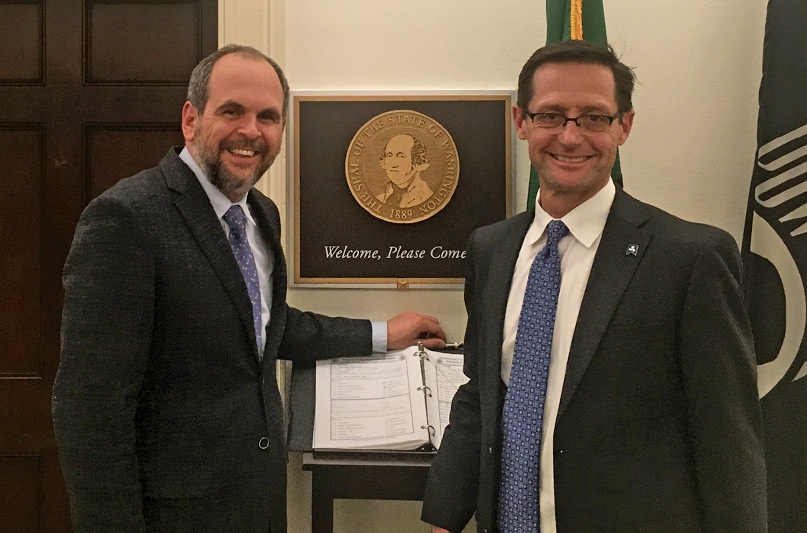The boating world comes together each year for 64 hours in Washington, D.C. to hear about the top issues facing the $121 billion industry at the American Boating Congress (ABC). This year featured roundtable discussions about the most pressing issues facing the industry, a series of A-list speakers (including EPA top administrator Scott Pruitt, Department of Interior Secretary Ryan Zinke, and Fox News anchor Chris Wallace), and visits with elected members of Congress. Bottom line; there’s way more to the ABC than one-way meetings.
Each year brings a different flavor to the ABC and this year was no different. What set this year’s event apart was the unprecedented access our sector had with the current administration. Typically, a handful of top staff would show up but this year there were some high-level political players such as the aforementioned cabinet members plus top economists speaking to the strength of economy. The multitude of topics gave the 260 attendees the chance to learn more and hear specifics about the most important issues of the day. Here are some important points:
Tarrifs:
Aluminum tariffs are not helpful to reducing the cost of boating. As Rep. Derek Kilmer (Democrat-Bremerton) said, “As a general rule, I’m not for bigger barriers in trade.”
Workforce Shortage:
Boating has a serious threat when it comes to finding a workforce today and in the future. There are both short-term and long-term challenges finding workers who can build and fix boats. The National Marine Manufacturers Association President Thom Dammrich said it best:,“Frankly, the problem is there aren’t enough workers. It’s not that there aren’t enough workers that are trained, there just aren’t enough workers. The solution is legal immigration.”
Ethanol:
While not as heady a topic as with previous ABCs (this was my seventh), its perennial status keeps it on our agenda. With the Renewable Fuel Standard mandating an increase to 15% of fuel to consist of ethanol (what’s called E15), it’s imperative for our coalition to provide alternative solutions. These include:
- Ensure that E10 (10% of the fuel is ethanol), which is safer for marine engines, remains widely available at gas stations across the country.
- Develop a pro-active education campaign to protect the American public from the corn lobby. As E15 enters the market, consumers need to be warned and informed about its dangers.
- Promote safer renewable fuels like biobutanol.
Closer to home, Northwest Marine Trade Association’s President George Harris, Mayor David Baker of Kenmore, Washington, and I blitzed Congressional offices on our one day on The Hill. We met with ten of the 11 members of the congressional delegation (or their staffers) and highlighted two issues of utmost importance: securing Ballard Locks funding and the importance of recreational fishing to the boating businesses in Washington.

The good news with the Ballard Locks funding is that it ranks with mom and apple pie when it comes to mainstream opinion. The bad news is that such a vanilla topic is darn near impossible to elicit passion for funding the $12 million needed to replace the Locks’ culvert valves. From a sales perspective, the logic of bringing up the Ballard Locks ahead of sportfishing is that it gets the customer (i.e. the lawmaker) nodding and in agreement that this is important. As they say in sales, the first “yes” is the most important to get a deal completed.
If the Ballard Locks are a true no-brainer, recreational fishing remains a binary choice for elected officials. It’s important to note that recreational fishing occurs on 70% of recreational boats (last year it was 60%) and as Jeff Angers, President of the nonprofit Center for Sportfishing Policy, told me, “What’s good for [recreational] fishing is good for boating.”
At this point of the 15-minute meetings, I would hand over the conversation to George Harris, who was recently appointed to Governor Inslee’s task force to save the Southern Resident killer whales. George would guide the conversation away from mentioning the elephant in the room (i.e. Boldt Decision) and towards how recreational anglers disproportionately get squeezed on their fishing opportunities compared to commercial and tribal anglers. We had the most momentum when we focused attention on a common enemy, seals and sea lions who gorge on Chinook salmon.
Time will tell what deliverables come from this experience. One stalwart truism that ties these seven annual ABC meetings together is already quite apparent: it’s so much easier for our group to ask for something if we have a relationship already in place before that ask occurs. Flying cross-country back to my Seattle home from this trip (and having snuck in a tour of Thomas Jefferson’s Monticello while I was there), I reflected on my time in D.C. It’s easy to rag on our nation’s capital but if you put on a different lens, I’m darn proud to call myself an American after a week like this past one.